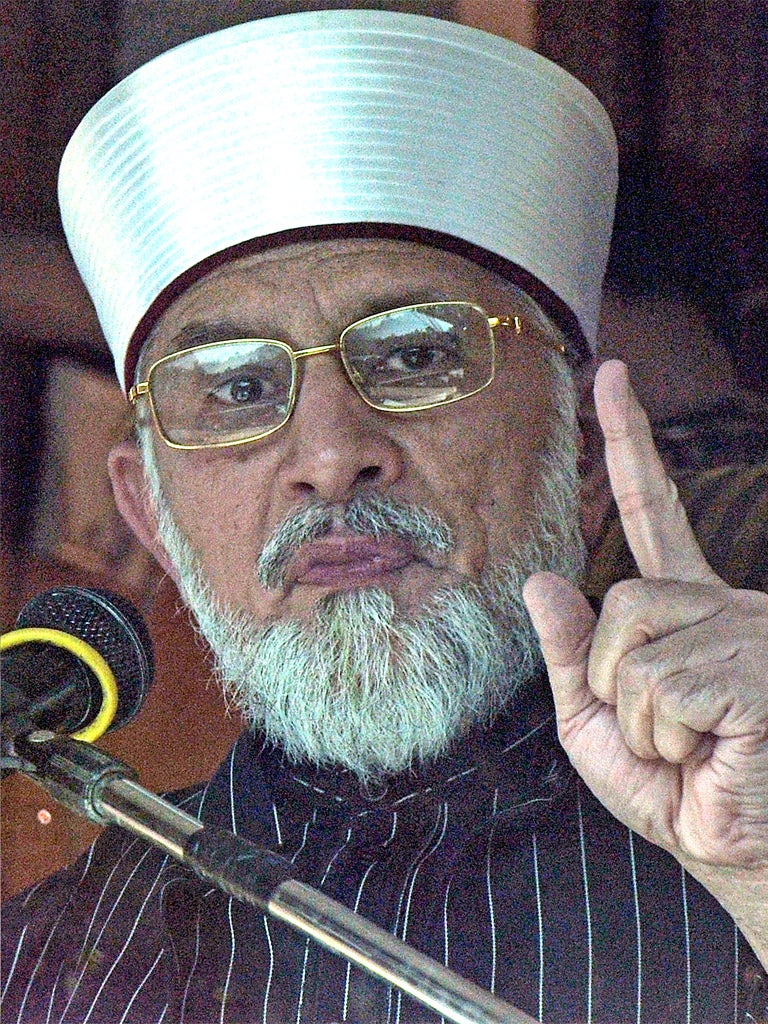Protest leader Tahir ul Qadri accused of inciting a revolution in Pakistan

Your support helps us to tell the story
From reproductive rights to climate change to Big Tech, The Independent is on the ground when the story is developing. Whether it's investigating the financials of Elon Musk's pro-Trump PAC or producing our latest documentary, 'The A Word', which shines a light on the American women fighting for reproductive rights, we know how important it is to parse out the facts from the messaging.
At such a critical moment in US history, we need reporters on the ground. Your donation allows us to keep sending journalists to speak to both sides of the story.
The Independent is trusted by Americans across the entire political spectrum. And unlike many other quality news outlets, we choose not to lock Americans out of our reporting and analysis with paywalls. We believe quality journalism should be available to everyone, paid for by those who can afford it.
Your support makes all the difference.Tahir ul Qadri, the religious cleric whose supporters have besieged Pakistan’s capital with demands of political reforms, today called for the government, parliament and the Election Commission to be dissolved.
The charismatic Qadri, who promised to bring an Arab Spring-style revolution to Islamabad, laid out his agenda in detail for the first time, in a mammoth three-and-a-half hour address. He arrived in Islamabad on Monday, with around 50,000 supporters and has pledged to remain until his demands are met.
However, there were signs that authorities’ patience with Qadri’s demonstration was waning. Asma Arbab, a member of parliament for the ruling Pakistan Peoples Party, said: “This is not a protest. The capital has been taken hostage. They are inciting revolt.”
Meanwhile, there was no sign of any law enforcement agency implementing an order made by the Supreme Court on Tuesday for the arrest of prime minister Raja Pervez Ashraf, which pushed the political situation towards a tipping point. Officials said the National Accountability Bureau (NAB), which would carry out the arrest, had not yet received direct orders to arrest Ashraf, and the NAB chief would go the Supreme Court today [Thursday] to discuss the issue.
The government suspects that the judiciary and the military are supporting the cleric Qadri and his demands for reform, in an attempt to prevent the forthcoming election from taking place. If it does go ahead, it would mark the first time that an elected government in Pakistan completes its term and hands over to another elected administration.
In an attempt to quell fears over the election, the government gave an indicative date for it to be held. Khursheed Shah, a senior government minister, said that the polls would be held between the 4-6 May and “no later”. Under the constitution, a neutral caretaker government must be installed to oversee the election.
Several main political opposition parties came out against Qadri and his demands for political reform today.
Imran Khan, the cricketer turned politician, has been under enormous pressure to come out in support of Qadri, as both rail against a corrupt political system. But Khan distanced himself from the protest, calling it “premature” on Twitter. Khan added: “However what he [Qadri] is saying is our agenda too”.
Mr Khan, the other opposition parties, and the government all fear that Qadri’s real agenda is to prevent any elections taking place, by prolonging for years the tenure of the caretaker government, though Qadri claims that his reforms can be implemented during the 90-day legal tenure of the caretaker regime. Qadri has said that the military and the judiciary must have a say in the composition of the caretaker government,
Nawaz Sharif, the former prime minister, called a meeting of the main opposition parties, after which, with the other leaders all standing behind him, he said that: “We will resist any attempt to derail the democratic process”.
The West is also concerned that Pakistan’s fragile democracy could be snuffed out. In a statement, a spokesperson for Britain’s Foreign Office, said: “The UK strongly supports democracy in Pakistan. Representative, accountable, government that delivers for the people, and is chosen according to constitutional processes, is in the best interests of Pakistan.”
Pakistan has been ruled for half its history directly by the military, which has intervened repeatedly to end the tenure of every civilian government, either by supporting civilian challengers or by seizing power for itself.
Meanwhile, Dr Qadri remains confident. Addressing the government, Qadri said in his speech: “Today, power is in your hands. Tomorrow, it will be in the hands of the people. You have one or two days left.”
Join our commenting forum
Join thought-provoking conversations, follow other Independent readers and see their replies
Comments